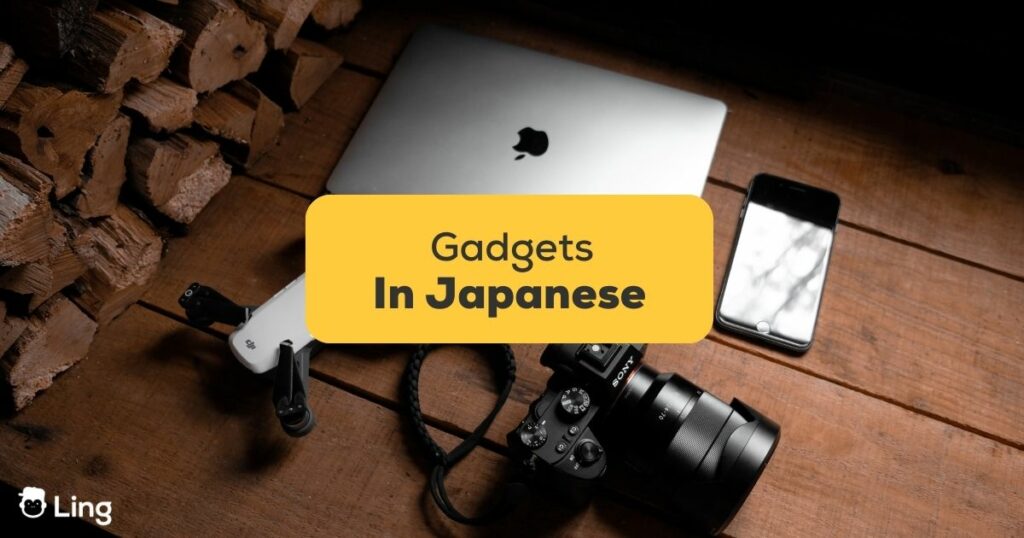In today’s super tech-savvy world, gadgets have become an essential part of our daily lives. From smartphones to laptops, these devices seamlessly integrate into our routines, making tasks easier and communication more efficient. In this blog post, we will delve into the fascinating realm of Japanese words for gadgets, giving you a glimpse into Japan’s rich technological landscape and linguistic nuances.
Japan, renowned for its technological advancements and innovation, has its own set of captivating words to describe various gadgets. These terms not only reflect the functionality and purpose of the devices but also provide a glimpse into the Japanese culture’s emphasis on efficiency, portability, and attention to detail. Curious? Let’s get all your questions answered in the sections below!

What Is “Gadgets” In Japanese?
In Japanese, the word for “gadgets” is gajetto (ガジェット). This direct translation captures the essence of what gadgets represent – technologically advanced devices that bring convenience, efficiency, and entertainment into our lives. As you probably noticed, we used katakana in writing “gajetto” because it highlights the foreign origin of this word. With this said, it showcases how Japanese culture seamlessly incorporates international technological advancements to create its own unique gadgets and terminology.
Synonyms For “Gadgets” In Japanese
Synonymous with “gajetto,” you may also come across other words to describe gadgets in Japan, each with its own nuances and specific applications. Here are a few additional terms that you might encounter:
- Gizumo (ギズモ) – Taken from the English word “gizmo,” this term is commonly used for small and innovative gadgets or devices with unique and quirky features.
- Dōgu (道具) – Although not specifically a synonym for “gajetto,” the word “dōgu” means “tool” or “instrument.” In certain contexts, it can encompass a broad range of gadgets used for various purposes.
- Kaden (家電) – This word refers specifically to household electronic appliances or gadgets. It combines the kanji characters for “home” (家) and “electricity” (電), highlighting the role of these devices in domestic settings.

Japanese Words For Gadgets
Whenever I think about high quality gadgets, I always think of Japan. Their products are just super great; that’s why I’m not surprised why this “greatness” extends to the unique vocabulary used in Japan to describe these cutting-edge devices. In this section, we will explore some informative Japanese words for gadgets that highlight the country’s technological advancements and cultural nuances.
Keitai Denwa (携帯電話)
Keitai Denwa refers to a mobile phone or cellphone. The word “keitai” means “portable” and “denwa” means “telephone.” In Japan, mobile phones have always been at the forefront of communication technology. They are seen as an essential part of daily life, with advanced features such as mobile payments and extensive connectivity options.
Pasokon (パソコン)
Pasokon originates from the English term “personal computer.” It is a commonly used word in Japan to refer to desktop or laptop computers. Pasokon has become an integral part of work and personal life in Japan, with a strong emphasis on technological advancements, efficiency, and reliability.
Denshi Jisho (電子辞書)
Denshi Jisho refers to electronic dictionaries. In Japan, where language learning is highly valued, electronic dictionaries have become indispensable tools for students and language enthusiasts. Portable and offering quick word look-up capabilities, denshi jisho devices assist in language acquisition and provide added convenience.
Furasshu Doraibu (フラッシュドライブ)
Furasshu doraibu is the Japanese word for “flash drive” or “USB stick.” Derived from the English word “furasshu,” which signifies fast data transfer, and “doraibu,” meaning “drive,” furasshu doraibu represents the high-speed data sharing capabilities of these devices. Flash drives are commonly used for portable data storage and file transfer.
Kamera (カメラ)
Kamera is the Japanese term for “camera,” derived from the English word “camera.” It describes any type of camera, including digital cameras and smartphone cameras. Japan’s rich history of photography and technology has contributed to the widespread use and advancement of cameras in the country.
Terebi (テレビ)
Terebi is the Japanese word for “television,” originating from the English word “television.” It reflects the widespread use and popularity of televisions in Japanese households. Japan is known for its high-quality television sets and entertainment industry.
Sumātofon (スマートフォン)
Sumātofon is a casual way to refer to smartphones in Japanese slang. Derived from the English term “smartphone,” it showcases the popularity and widespread use of smartphones in Japanese society. These devices are known for their advanced features, including internet connectivity, high-quality cameras, and a wide range of applications.
Mikurokei Kamera (ミクロ系カメラ)
Mikurokei Kamera refers to “micro cameras” in Japanese. It describes digital cameras that are attached or built into microscopes, commonly used in scientific research and analysis. These specialized cameras allow researchers to capture highly detailed images and facilitate their studies.
Konpyuta (コンピュータ)
Konpyuta is another Japanese word for computer, derived from the English word “computer.” This word is used interchangeably with “pasokon” but is sometimes used to refer specifically to mainframe computers.
Bideo-Kamera (ビデオカメラ)
Bideo-kamera is the Japanese term for “video camera,” which is used to record high-quality video footage. These cameras are commonly used in the media and entertainment industry and have played an important role in Japan’s television and film production.
Learn Japanese With Ling
If you’re interested in learning more Japanese words, phrases, and language skills, the Ling app is a great resource to explore. With its user-friendly interface, interactive lessons, and extensive vocabulary, Ling offers an immersive language learning experience.
Whether you want to improve your proficiency in Japanese or simply want to expand your knowledge of Japanese gadgets and technology, Ling provides a comprehensive platform that caters to learners of all levels. From essential vocabulary to useful phrases and grammar structures, Ling offers a structured curriculum that will help you build a solid foundation in the Japanese language.
Download Ling from the App Store or Play Store now!



































































